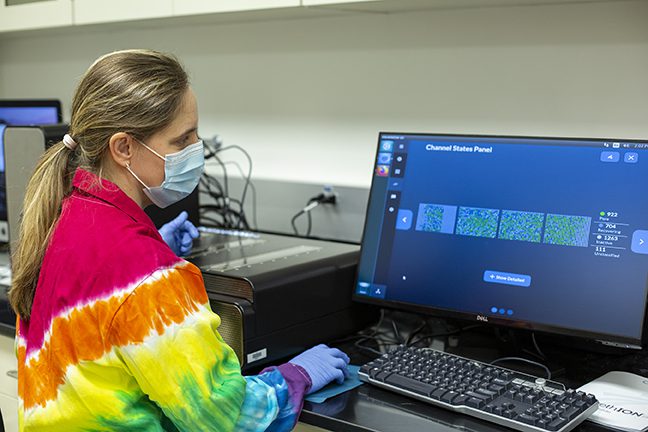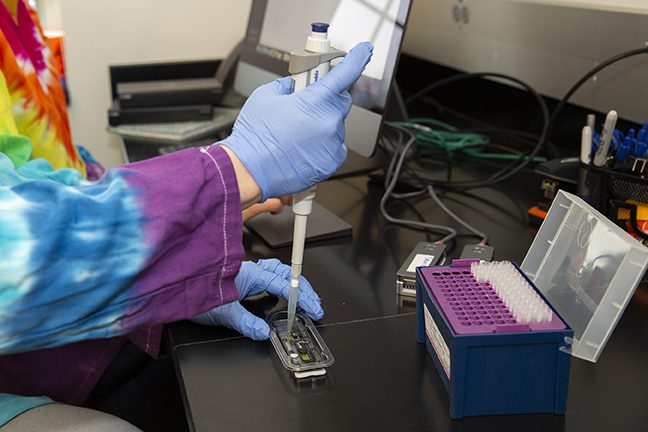Charlotte’s bioinformatics lab informs Mecklenburg County’s COVID-19 public health approach

Since the emergence last summer of the COVID-19 delta variant, UNC Charlotte has partnered with the Mecklenburg County Health Department to provide genome sequencing — the process of extracting and examining RNA from positive COVID-19 tests — to help health officials determine where in the county the coronavirus and its variants are present and might prompt widespread infection. This specialized information leads to decisions that affect the overall health and safety of residents countywide.
“As new COVID-19 variants emerge, it is critically important for us to monitor the variants circulating in our community,” said Raynard Washington, Mecklenburg County’s deputy health director. “The ongoing partnership between Mecklenburg County Public Health and UNC Charlotte is a model for how public-academic partnerships can both advance science and support the community in major public health efforts that help us combat this pandemic.”
University researchers also are applying the sequencing process to analyze the properties of COVID-19 cases on campus, a key factor in UNC Charlotte’s ability throughout the fall semester to maintain positivity rates markedly lower than those of surrounding Mecklenburg County and the city of Charlotte.
Rick Tankersley, vice chancellor for research and economic development, outlines UNC Charlotte’s sequencing expertise and how partnering with Mecklenburg County benefits the county, its residents and the University.

Why is UNC Charlotte the right partner for Mecklenburg County in regard to COVID-19 sequencing services?
RT: UNC Charlotte is uniquely qualified as the only resource in Mecklenburg County with expertise in bioinformatics and computational biology — disciplines that are essential for effective and accurate sequencing — as well as the scientists and technology necessary for processing and interpreting the complex data that COVID-19 sequencing generates. The partnership provides an opportunity for our research faculty and students to contribute significantly to the ongoing health and safety of our community as the changing nature of the coronavirus requires constant evaluation and informed decision making.
What does the partnership offer the city of Charlotte and surrounding area?
RT: The county works with locally based StarMed Healthcare to collect and process COVID-19 tests from various testing sites in Charlotte and deliver the samples with positive results to UNC Charlotte’s bioinformatics lab to analyze them further. This process, known as sequencing, indicates the presence and properties of variants, or different versions of the virus, and helps to pinpoint their prevalence by geographic location and calculate the potential trajectory for spread in a given community. With this information, health department officials can make decisions and take actions based on targeted facts and determine how best to mitigate widespread infection.
How did UNC Charlotte develop the capability for virus sequencing on a broad scale?
RT: The foundational components for this work in bioinformatics, engineering and computational biology have been in place at UNC Charlotte for some time. Support appropriated in 2020 by the N.C. General Assembly from the CARES (Coronavirus Aid, Relief and Economic Security) Act enabled further investment in equipment, technology and personnel to expand the labs’ capabilities for this specific purpose. This enabled us to also undertake sequencing services for North Carolina’s entire southwest region. Faculty members have widened their professional networks through participation in a statewide consortium of sequencing labs. UNC Charlotte is the only university not affiliated with a medical school, which speaks to the depth of knowledge and skills that exist on our campus. Equally important are the valuable firsthand experience our graduate students and postdoctoral fellows are gaining in the sequencing labs and the impact their work is making on our region.
Are there key lessons to note from UNC Charlotte’s virus sequencing experience?
RT: From start to finish, the COVID-19 sequencing process takes five to seven days for each sample. This means variants — including the delta and omicron variants currently of nationwide concern — are likely to be present in a community for at least several days before they are identified with certainty, giving them ample time and opportunity to spread. While sequencing provides tremendously valuable information about existing COVID-19 cases in our city and surrounding area, it can’t prevent new cases. Only the vaccine can do that. The primary lesson for stopping the virus remains to aim for the highest number possible of people to be vaccinated against COVID-19.

UNC Charlotte’s sequencing lab in the news:
-
WCCB: UNC Charlotte sequencing lab searching for omicron variant in Mecklenburg County
-
WSOC: Local researchers discuss vaccine effectiveness of omicron variant
-
WCNC: UNC Charlotte lab may be first to discover omicron variant in the Carolinas
-
FOX 46: Too early to tell if omicron is more dangerous than Delta
-
Spectrum News: UNC Charlotte lab searching for omicron variant